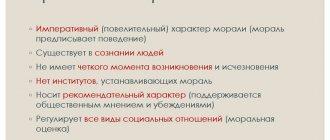Life values are an integral part of the human worldview, confirmed by his consciousness, upbringing, life experience, and personal experiences. They are revealed by limiting the most significant and important from the unimportant. The accumulated baggage of certain values modifies a person’s consciousness, regulates and motivates his activities, and ensures the formation of a strong personality.
Each person sets priorities in his own way, individually, and determines the importance and significance of certain phenomena. The list of generally accepted values includes traditional material values. These include jewelry, fashionable branded clothing, paintings, modern technology, cars, real estate and much more. spiritual , religious, moral and aesthetic values (holiness, kindness, compassion, decency, cleanliness, etc.) should be noted A separate category are social , such as position in society, social security, power, career, family, freedom and others.
Let us dwell in more detail on some universal human values.
Family and friendship
Family well-being, children, parents, friends - for most people this is the greatest value. Loving our family, our parents and children, and taking care of them is our sacred duty and privilege. Always treat your friends and the people around us with respect, sincerity and love, always be responsive and tolerant - this is a huge amount of work that must be paid for the value of human relationships. What do these relationships give us? They are a source of mutual support and sympathy, common goals and interests, understanding and emotional attachments.
What are they needed for
The direction of moral values is determined by upbringing from childhood. They can be formed both positive and negative. Many nations have stereotypical moral principles necessary for building a civilized society, in which public well-being should become more important than personal advantages acquired at the expense of others. Moral principles regulate the thoughtfulness of statements and the evaluation of actions in advance of their commission. They advise taking into account the interests and rights of other people, which not every person actually does. Differences in people's moral values can be so radical that contact can lead to a conflict situation.
Generalized ideas of morality are the concepts of good and evil, which differentiate morality and immorality. By tradition, goodness is associated with benefits for people. Although this concept has a relative meaning, because at different periods of time the benefit is assessed differently. Adherence to common moral traditions and canons, as well as inherent priorities, helps a person lead a harmonious and balanced lifestyle in society. And people whose rules and assessments do not correspond to generally accepted ones are often forced to exist separately, in isolation. An individual who commits unkind, impudent, humiliating acts deserves only disapproval and reproach.
Moral principles allow individuals to:
- comfortable to exist in the environment;
- to be proud of useful and noble deeds, a clear conscience.
Material well-being and career
There is no person in the world who would not like to stand firmly and confidently on his feet, not need anything, and ensure the well-being of his family. However, not everyone puts material wealth in first place in the conditional ranking of life values. Often a person faces a dilemma: work in a friendly team with loyal superiors, receiving moral satisfaction from work, or make a choice in favor of large fees, putting their personal life and health at stake. The ideal option is one in which work allows you to embody the most incredible ideas, gives you many useful contacts, and brings you both money and pleasure. But more often than not, something still has to be sacrificed, and the main thing here is not to make a mistake in choosing.
Why do people have values?
Values—such as attitudes, plans, and goals—are heuristics that help us avoid endless calculations every time we want to act.
In order not to constantly calculate what to hide and what not, a person by default accepts the general value of honesty.
Values are a form of knowledge about what generally works and is suitable for life..
Health
For many people, especially in adulthood, health becomes the first step of the value pedestal. At the same time, for some people, house, money, cars and vacations at expensive resorts come first. And some of them sometimes do not understand very well that a sick person no longer cares about anything except health, he is ready to give all material goods in exchange for recovery, but this is not always possible. You need to be more careful about your physical condition , not kill yourself with bad habits and excessive hard work, give relief to your body and devote enough time to rest and sleep. It is extremely important to realize that health is the most valuable thing in the life of any person, because health is necessary for everyone without exception.
LiveInternetLiveInternet
In recent years, technological projects aimed at modernizing various spheres of life have been actively initiated in our society. Unfortunately, they consider exclusively the technocratic component. At the same time, all these projects fall on the old soil of outdated social values. New technological initiatives need a new concept of social relations, a new value system, which would become the necessary cement to strengthen the innovative basis of these projects.
Recently, such a term as “universal human values” has disappeared from public circulation. I would like to recall the existence of this cornerstone concept, because... it is precisely this that will give innovation a solid foundation and create, simultaneously with technical modernization, a fundamental spiritual framework designed for the long term.
Universal human values are fundamental, universal guidelines and norms, moral values that are the absolute standard for people of all cultures and eras.
The stunning variety of points of view on this issue includes ideas about universal human values, as a material, spiritual, and intellectual phenomenon. Sometimes universal human values are confused with the values of humanity - water, air, food, flora and fauna, minerals, energy sources, etc. Or with values that have state (public) status - country security, economy, healthcare, education, everyday life, etc. Therefore, some consider “values” to be stable, unchanging, while others consider them to change depending on changes in economic, political, military and other conditions, on the policies of the ruling elite or party, on changes in the socio-political system, etc.
We will consider the OC - as a timeless phenomenon, as the original fundamental axioms, which can be referred to as: “principles”, “laws”, “installations”, “commandments”, “covenants”, “credos”, “creeds”, “canons” ", "spiritual axioms", etc. This is an absolute, enduring and highly significant need of both humanity as a whole and an individual, regardless of gender, race, citizenship, social status, etc.
In direct connection with the understanding of OC is the idea of two options for social relations: “There are two understandings of society: either society is understood as nature, or society is understood as spirit. If society is nature, then the violence of the strong over the weak, the selection of the strong and the fit, the will to power, the domination of man over man, slavery and inequality, man is a wolf to man, is justified. If society is spirit, then the highest value of man, human rights, freedom, equality and brotherhood are affirmed... This is the difference between the Russian and German ideas, between Dostoevsky and Hegel, between L. Tolstoy and Nietzsche” (N. Berdyaev).
One of the central and most important OCs is the life of an individual person, which acts as the ontological (existential) basis of all other values.
Another important universal value is creativity . It is creativity that allows a person to feel and realize himself as a creator, the creator of something unprecedented, something that has never existed before. It elevates a person, makes his “I” not only especially significant, but also unique. This is an active value. The results of creativity capture the unity of the external and internal world of man. Both primitive man, a child, and a modern adult experience special, joyful emotions when they manage to discover, invent, invent, construct, create something new that does not exist in nature, or improve what has already been created previously.
Creativity manifests itself not only in utilitarian, cognitive, research activities, but also in the moral and especially brightly in the artistic and aesthetic sphere. Already in primitive society, people painted, sculpted, sculpted, carved, decorated their homes, household items, clothing, weapons, tools, objects of worship, and themselves; they sang, played music, danced, and performed scenes of various types. This suggests that the beautiful (beauty) can be considered as the highest aesthetic value.
People have always felt the need to search for truth . In the pre-scientific era, people’s understanding of truth was very multifaceted: it included experimental and sacred knowledge, legends, beliefs, omens, hopes, beliefs, etc. Its bearers were especially respected: old men, wise men, sorcerers, soothsayers, priests, philosophers, scientists. Far-sighted rulers cared about the development of science and education... That is why truth can be put on a par with other initial values. This is the highest intellectual value, the value of man as Homo sapiens.
In unity with the considered values, a sense of justice is formed and operates . Justice is ensuring the interests of people and respecting their dignity. The affirmation of justice generates satisfaction in people. While injustice causes resentment, indignation, anger, hatred, envy, vindictiveness, etc., it pushes us to fight for the restoration of justice. This suggests that justice is the most important moral and legal value.
A number of authors in this context interpret material wealth as the highest utilitarian value for man as a physical being. (But such an interpretation of material wealth clearly does not fit into the approach we have chosen).
Two “ranks” of opposites are lined up: “life - good (good) - creativity - truth - beautiful - justice" and "death - idleness - evil - lies - ugly - injustice." In the first chain of concepts, values are interconnected by a certain correspondence, kinship, they are in unity with each other, and in the second, all anti-values are in their unity, correspondence, kinship.
Some authors distinguish between biological man and social man. If the first is concerned with satisfying his needs - food, clothing, housing, reproduction of his kind... Then the second, like a rosary, goes through the options: what is profitable and not profitable... He has no internal restrictions, he, as a rule, is devoid of conscience. The third type of person is a spiritual person - this is, in short, a person with a conscience . In other words, with the ability to distinguish between good and evil. OC can also include such values as the meaning of life, happiness, goodness, duty, responsibility, honor, dignity, faith, freedom, equality ...
In the modern era of global change, the absolute values of goodness, beauty, truth and faith as the fundamental foundations of the corresponding forms of spiritual culture, presupposing harmony, measure, balance of the holistic world of man and his constructive life affirmation in culture. Goodness, beauty, truth and faith mean commitment to absolute values, their search and acquisition.
The Biblical moral commandments are of enduring importance: the Old Testament Ten Commandments of Moses and the New Testament Sermon on the Mount of Jesus Christ.
In the history of every people, every culture, there is changeable and constant, temporary and timeless. One grows, reaches its peak, grows old and dies, while the other, in one transformed form or another, passes from one form to another, not changing internally, but transforming only externally. OC is something that remains eternal and unchanged throughout history, residing in the depths of universal human culture. This is a moral axiomatics, something indisputable and universal, those spiritual supports that “hold” the world, like the physical constants on which all scientific knowledge rests.
The very phrase “universal human values” was introduced into use by M. S. Gorbachev during perestroika as a counterbalance to the “class morality” that had previously dominated in the USSR.
There is an opinion that following universal human values contributes to the preservation of the human species. At the same time, a number of universal human values can exist as archetypes.
Examples
— Many basic laws that exist in almost all countries relate to universal human values (for example, the prohibition of murder, theft, etc.).
— Many liberal principles, such as freedom of speech and human rights, are universal human values.
— Some religions consider their laws to be universal human values. For example, Christians include the Ten Commandments as such.
— It is often argued that the so-called “golden rule of morality” - “Don’t do to others what you don’t want done to you” - can be an example of a universal value.
In preparing the material we used: Encyclopedia of Sociology, Wikipedia, articles by V. Efimov, V. Talanov and others.
https://inductor1.ucoz.ru/publ/obshhechelovecheskie_cennosti/31-1-0-498
Self-development
The development of the personality itself is very valuable. A person matures, becomes wiser, gains useful life experience, makes correct, informed and balanced conclusions and, accordingly, makes the right decisions in any life and professional issues. He controls his emotions, is cultured in communication, develops his horizons, and becomes the right guide for the younger generation. A comprehensively developed person pays attention to his health, physical fitness and appearance, is neat in everything, clean both in thoughts and in relationships. A person who makes every effort for personal growth and self-improvement strives to change his attitude towards life, to understand his role in the world, and to improve relationships with people around him.
Thread in time
Moral values are a connection between generations, allowing elders to pass on experience to their heirs, share what they have achieved and push them to further movement and progress. Based on such a foundation, new people create their own priorities and improve existing ones. Moral values, in relation to culture, include an ideal to which it is worth striving, as well as one or another property of a thing that brings it closer to the best state.
It is also worth noting that views can be individual, collective, group, universal, national. Personal moral values are how significant an object, idea or phenomenon is in the eyes of a particular person. It all depends on the level of knowledge, tastes, habits, inclinations, and other personality traits.
Each individual attaches great importance to this aspect of his life, but also largely relies on the opinion of society. Consequently, on the values accepted by a group of people, which he accepts and shares. In order for a team, organization or society to exist harmoniously, they must have that important, reverent attitude towards which they can share.
People whose accents and priorities are set in a similar way usually find a common language much better. In this way, individuals unite towards similar goals.
Creation
The value of creativity lies in the unique opportunity to realize your ideas. Creativity gives complete freedom of self-expression to the author, allowing him to bring to life his wildest thoughts, emotions, and images through the creation of the final product. Creative people are people with a fine mental organization; they are artists, musicians, sculptors, designers, fashion designers and many other people of art. They try to realize themselves in creativity, combining their calling, their talent with everyday activities and household responsibilities. Muse is the most important value in their development. The process of creating another masterpiece becomes the meaning of life, and inspiration makes this process incredibly easy and enjoyable.










